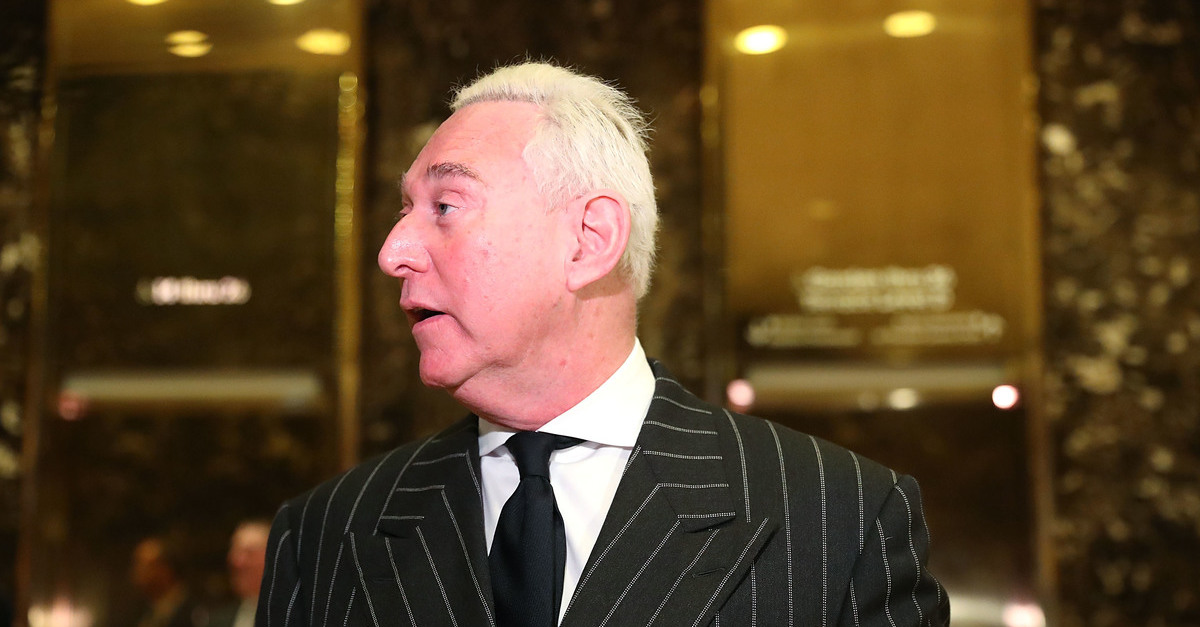
Redacted transcripts and other documents from the trial of Roger Stone were released by a federal court on Wednesday. Some of those documents candidly reveal the political and moral biases of several jurors who were stricken for cause by the government.
One such voir dire request asks one potential juror: “Please indicate if you already have an opinion about any of these individuals, or if the fact that they may be involved in the case would make it difficult for you to be fair and impartial to both sides?”
To which the stricken juror responded:
I believe Donald Trump conspired with Russian agents to rig the 2016 election. I believe Roger Stone is a bag man and will receive a pardon should the jury find him guilty.
Another voir dire question posed: “Is there anything about this case, the issues, or the people involved in this case, or any other reason that has not been asked about in any other question, that leads you to believe you could not be completely fair to both the defendant, Roger Stone, and the U.S. Government in this case?”
The potential juror marked “Yes” and wrote:
I am strongly opposed to President Trump. I am concerned that his cohort of associates reflect his same immorality.
Another potential juror was asked: “Have you read or heard anything about the defendant Roger Stone, about any statements made by or attributed to Mr. Stone, or about this case? If so, please describe what you have read or hear about the source of the information.”
This stricken would-be juror wrote:
Yes. Mr. Stone is a greedy man with no moral compass. He has a complete disregard for the Constitution.
The same juror was also asked: “Please indicate if you already have an opinion about any of those individuals, or if the fact that they may be involved in the case would make it difficult for you to be fair and impartial to both sides?”
The stricken-for-cause juror added:
Yes. I have a strong opinion that Mr. Stone is an evil man.
The voir dire questions from the government, of course, were repeated to many of those in the original jury pool.
Another possible juror was asked: “Is there anything about this case, the issues, or the people involved in this case, or any other reason that has not been asked about in any other question, that leads you to believe you could not be completely fair to both the defendant, Roger Stone, and the U.S. Government in this case?”
“My political beliefs and opinions,” the juror replied. “I am not sure I could be objective.”
The court document containing the stricken juror responses was filed by Stone’s defense team as part of a motion for a new trial. Specifically, Stone’s attorneys argued that one particular juror should have never been allowed to judge the case and that her presence on the jury was directly offensive to standards of fairness and impartiality.
“The Motion is based on [the anti-Stone juror’s] extremely misleading answers during voir dire that conceal not only her strong political bias, but her pre-trial knowledge of, and views about, Roger Stone and the charges against him,” the filing notes. “The notion that any reasonable person would view this Juror as able to set aside her bias against Stone and serve as an impartial juror is impossible to reconcile with the evidence.”
Stone’s defense team argued that the jurors who were stricken for cause had and shared opinions effectively in line with the opinions that were shared by the anti-Stone juror who ultimately judged the defendant and voted in favor of his guilt.
The filing also contains voir dire responses from jurors directly touching upon the social media angle.
Federal prosecutors asked one eventually unacceptable juror: “Have you written or posted anything for public consumption about the defendant, the House Permanent Select Committe on Intelligence investigation into Russian interference in the 2016 presidential election, or the investigation conducted by Special Counsel Robert Mueller?”
A bracketed aside on the voir dire sheet also notes: “For purposes of this question, writing ‘for public consumption’ includes blog posts, articles, or posts on internet sites that are accessible to the general public.”
The juror marked “Yes” and explained:
I’m sure I’ve posted comments on the Mueller Investigations on Twitter. Can’t recall what. Likely supportive of the investigation.
A follow-up question from the government asked that same stricken juror: “Please indicate if you already have an opinion about any of those individuals, or if the fact that they may be involved in the case would make it difficult for you to be fair and impartial to both sides?”
The juror replied:
I have opinions on Assange, Bannon, Clinton, Gates, Manafort, Podesta, Prince, and Trump. I don’t think it would impede my impartiality.
Stone’s defense put a fine point on their argument:
Based upon the questionnaire responses, there can be little doubt that if [the anti-Stone juror] had disclosed her tweets and revealed the extent of her political zealousness, she would not have been permitted to be a juror. In her social media posts, she declares President Trump a racist and that those associated with him are racist, too: “Co-signing and defending a racist and his racist rhetoric makes you racist. Point blank.”
Read the full filing below:
Roger Stone Juror Misconduc… by Law&Crime on Scribd
[image via Spencer Platt/Getty Images]